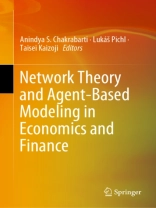This book presents the latest findings on network theory and agent-based modeling of economic and financial phenomena. In this context, the economy is depicted as a complex system consisting of heterogeneous agents that interact through evolving networks; the aggregate behavior of the economy arises out of billions of small-scale interactions that take place via countless economic agents. The book focuses on analytical modeling, and on the econometric and statistical analysis of the properties emerging from microscopic interactions. In particular, it highlights the latest empirical and theoretical advances, helping readers understand economic and financial networks, as well as new work on modeling behavior using rich, agent-based frameworks.
Innovatively, the book combines observational and theoretical insights in the form of networks and agent-based models, both of which have proved to be extremely valuable in understanding non-linear and evolving complex systems. Given its scope, the book will capture the interest of graduate students and researchers from various disciplines (e.g. economics, computer science, physics, and applied mathematics) whose work involves the domain of complexity theory.
विषयसूची
Research on loss absorption of financial group (bank network).- The Mathematics of Human Contact.- Does it still matter in the new world where a refugee comes from? – Social network, Shocks, and Ethnicity – A multi-level analysis.- The Transferability of Human Capital, the Brain Drain, and the Brain Gain.- Evolution in Anonymous Population Games with Multiple Types.- Analysis of search actions on the Internet including the effect of blog and Twitter using Sociophysics approach.- Statistical analysis of a political demonstration using location-based big data.- Different Type of Interaction Plays a Role of Decision Error on Collective Behavior.- A financial network approach to unconventional monetary policy assessment – the case of Quantitative Easing in the euro area.- From Housing Locale Theory to Agent-Based Modeling Approach.
लेखक के बारे में
Anindya S. Chakrabarti, Indian Institute of Management Ahmedabad
Lukas Pichl, International Christian University
Taisei Kaizoji, International Christian University












